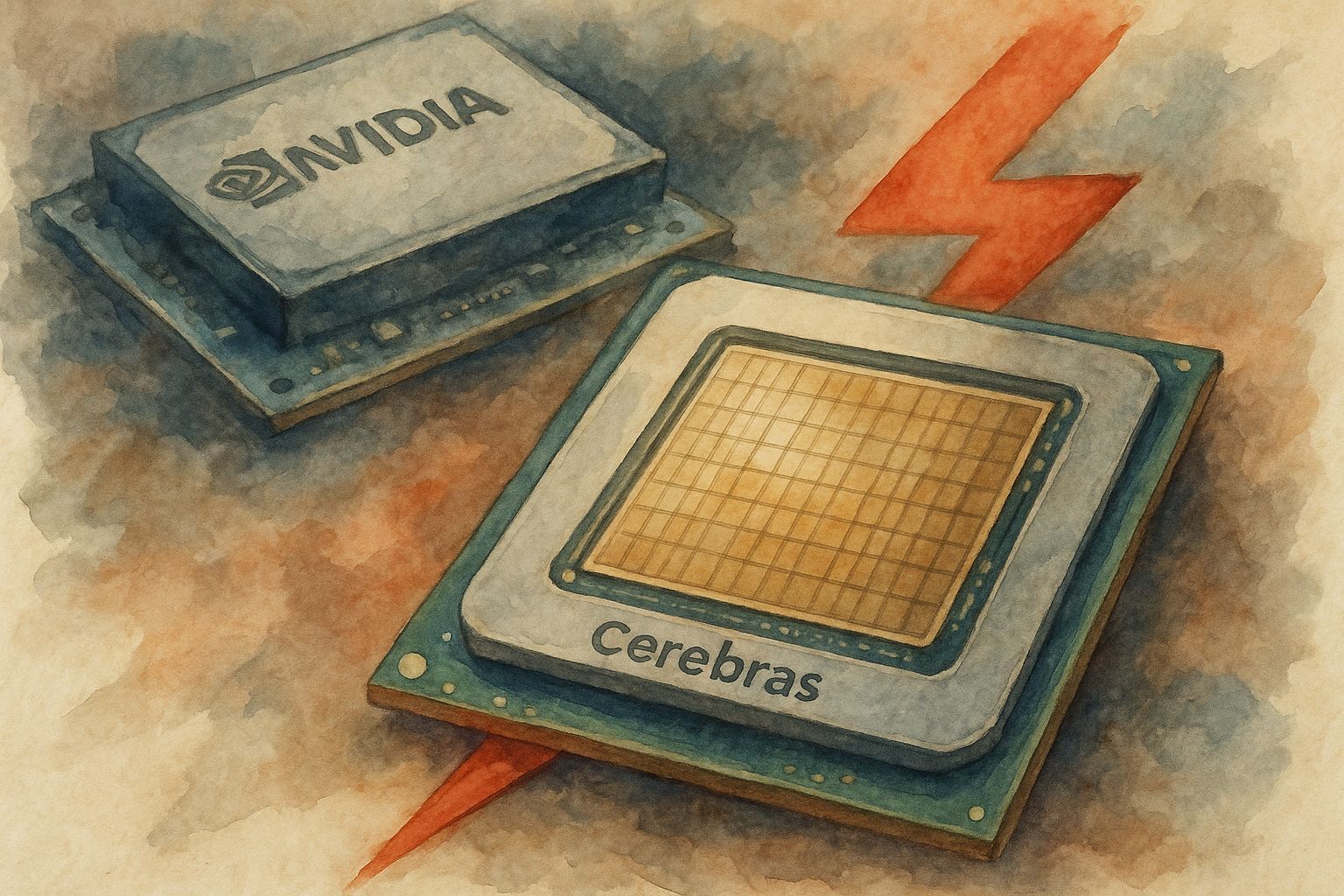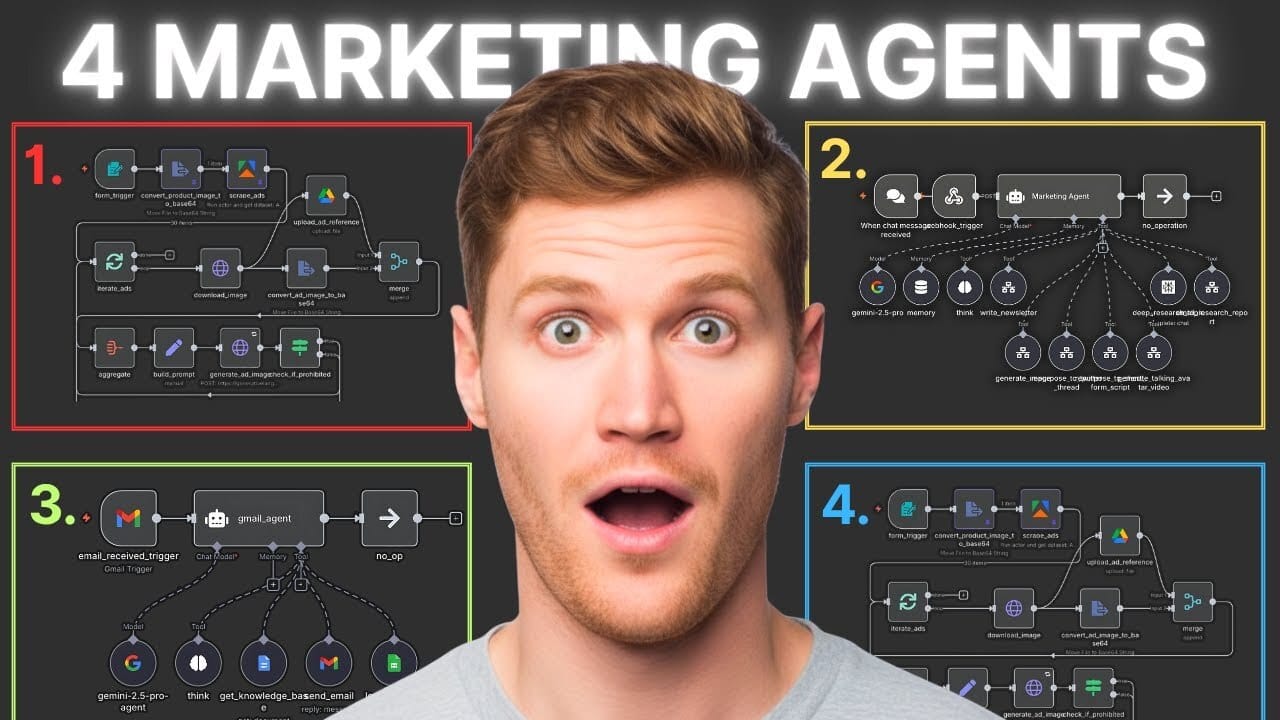- The Recap AI
- Posts
- Hollywood unites against its first AI actor
Hollywood unites against its first AI actor
PLUS: An $8B NVIDIA challenger, Meta's AI hardware blitz, and the arrival of Opera's agentic browser
Good morning, AI enthusiast.
The entertainment industry is drawing a clear line in the sand against the first AI-generated actor. The creators of "Tilly Norwood" are seeking official talent representation for the synthetic performer, sparking a massive backlash from Hollywood's creative community.
The unified rejection from unions and major agencies highlights a fundamental conflict over AI ethics and creative labor. With the industry refusing to engage, what legal and cultural precedents will this battle set for AI's role in entertainment?
In today’s AI recap:
The 4 AI Agents that run our marketing team and make us $1,000s (watch here)
Hollywood unites against its first AI actor
An $8B challenger to NVIDIA’s chip dominance
Meta's massive AI hardware investment
The arrival of Opera's agentic browser
8 trending AI Tools
Hollywood's AI Actor
The Recap: Hollywood is in an uproar over Tilly Norwood, a new AI-generated performer whose creators are seeking official talent representation, sparking a fierce debate about the future of acting.
Unpacked:
Tilly's creator positions her as a "creative work," yet has also stated the goal is for Tilly to become the "next Scarlett Johansson or Natalie Portman."
The backlash has been swift, with the SAG-AFTRA union issuing a formal condemnation, actors calling the project "terrifying," and major talent agencies like WME publicly refusing to represent the AI character.
At the heart of the controversy is the union's assertion that Tilly is a character generated by a computer program trained on the work of countless professional performers—without permission or compensation.
Bottom line: The Tilly Norwood saga is a real-world test case for AI ethics, intellectual property, and the future of creative labor. The industry's unified rejection signals a major cultural and legal battlefront for AI developers and studios.
Looking for unbiased, fact-based news? Join 1440 today.
Join over 4 million Americans who start their day with 1440 – your daily digest for unbiased, fact-centric news. From politics to sports, we cover it all by analyzing over 100 sources. Our concise, 5-minute read lands in your inbox each morning at no cost. Experience news without the noise; let 1440 help you make up your own mind. Sign up now and invite your friends and family to be part of the informed.
AI Tools of the Day
💻 Crowdbotics - Automatically reverse-engineer legacy applications into modern product requirements to de-risk and accelerate software development.
👄 LatentSync - Transform any video by automatically syncing lip movements to new audio in multiple languages for perfectly dubbed content.
🔗 Activepieces - Build powerful, AI-driven workflows between your favorite apps using an open-source, no-code automation platform you can self-host.
🔬 Laminar - Debug and evaluate your large language model applications with an open-source, framework-agnostic tracing tool built for AI engineers.
⚙️ Zoo - Design complex hardware and CAD applications programmatically with an API-first, GPU-powered geometry engine for developers.
💬 SceneSnap - Instantly master long video content by asking questions and getting summarized insights through an interactive chat interface.
⛽ DataFuel - Effortlessly create clean, structured training datasets for your RAG systems by turning entire websites into usable data with a single query.
🗺️ MyMap.AI - Brainstorm and visualize complex ideas by simply chatting with an AI that instantly generates interactive mind maps and diagrams.
Explore the Best AI Tools Directory to find tools that will 10x your output 📈
The $8B NVIDIA Challenger

The Recap: AI infrastructure company Cerebras Systems just raised a massive $1.1 billion at an $8.1 billion valuation. The new funding will expand production of its wafer-scale processors, which the company claims are significantly faster than NVIDIA's top GPUs.
Unpacked:
Cerebras claims its hardware delivers inference speeds more than 20X faster than comparable NVIDIA GPUs, a stat backed by independent benchmarking firm Artificial Analysis.
The performance comes from its unique Wafer Scale Engine 3, a single chip that is 56 times larger than the biggest GPU, designed specifically for AI workloads.
Major AI players are already on board, with customers like Meta, IBM, and Mistral using Cerebras to serve trillions of tokens per month.
Bottom line: This massive funding round signals that the AI chip market has a serious new contender, challenging NVIDIA's long-held dominance. For developers and businesses, this increased competition could accelerate innovation and drive down the cost of powerful AI compute.
AI Training
The Recap: In this video, I'm breaking down 4 of the marketing agents I've built to automate away my $100,000k+ marketing team. These include morning-brew style newsletter agents, content repurposing agents, ad generators, and SEO agents.
P.S. We also launched a free AI Automation Community for those looking to build and sell AI Automations — Come join us!
Meta's AI Hardware Blitz

The Recap: Meta is making a massive two-front push to secure AI computing power, planning to acquire chip startup Rivos for in-house development while also signing a $14 billion deal with cloud provider CoreWeave.
Unpacked:
The Rivos acquisition aims to accelerate Meta's custom silicon efforts, specifically its MTIA chip family, using the open-source RISC-V architecture to reduce long-term infrastructure costs.
The colossal $14 billion CoreWeave deal secures immediate access to a massive fleet of compute, including Nvidia’s latest GB300 systems, needed to train and run its current AI models.
This two-pronged approach shows Meta is aggressively building for the long term with custom chips while spending heavily to rent top-tier capacity for its immediate AI ambitions.
Bottom line: Meta is ensuring it has the raw power needed to compete in the AI race, investing billions in both building and buying its infrastructure. These hardware investments are designed to directly fuel the AI features powering everything from its smart glasses to its next generation of models.
Where AI Experts Share Their Best Work
Join our Free AI Automation Community
Join our FREE community AI Automation Mastery — where entrepreneurs, AI builders, and AI agency owners share templates, solve problems together, and learn from each other's wins (and mistakes).
What makes our community different:
Real peer support from people building actual AI businesses
Complete access to download our automation library of battle-tested n8n templates
Collaborate and problem-solve with AI experts when you get stuck
Dive into our course materials, collaborate with experienced builders, and turn automation challenges into shared wins. Join here (completely free).
The Agentic Browser Arrives

The Recap: Opera started shipping Opera Neon, its new subscription-based browser built around an AI agent that can autonomously handle complex, multi-step tasks. The browser moves beyond simple chat to execute commands and deliver outcomes directly within your workflow.
Unpacked:
Its “Neon Do” feature lets the AI agent operate locally inside your browser session, allowing it to fill out forms and navigate sites without sharing login credentials with cloud services.
Workflows are organized into “Tasks,” which are self-contained workspaces, and use reusable prompt instructions called “Cards” to quickly perform common actions.
Opera Neon enters a competitive field of agentic browsers, going up against rivals like Perplexity AI’s Comet and The Browser Company's Dia.
Bottom line: This launch signals a shift from browsers that simply display information to browsers that actively perform tasks on your behalf. It intensifies the race among big tech and startups to define the future of agentic web navigation.
The Shortlist
OpenAI is preparing to launch a standalone social media app featuring a TikTok-style vertical feed where all video content is generated by its Sora 2 model.
Amazon unveiled a new lineup of Echo speakers, including the Echo Studio and Echo Dot Max, featuring its upgraded Alexa Plus AI assistant and new AZ3 Pro chips for on-device processing.
The Wikimedia Foundation published a comprehensive human rights impact assessment analyzing the risks and opportunities of using AI and machine learning tools across Wikimedia projects.
Electronic Arts is reportedly set for a major AI pivot under its new owners, who plan to leverage the technology to significantly cut operating costs following the $55B buyout.
What did you think of today's email?Before you go we’d love to know what you thought of today's newsletter. We read every single message to help improve The Recap experience. |
Signing off,
David, Lucas, Mitchell — The Recap editorial team



